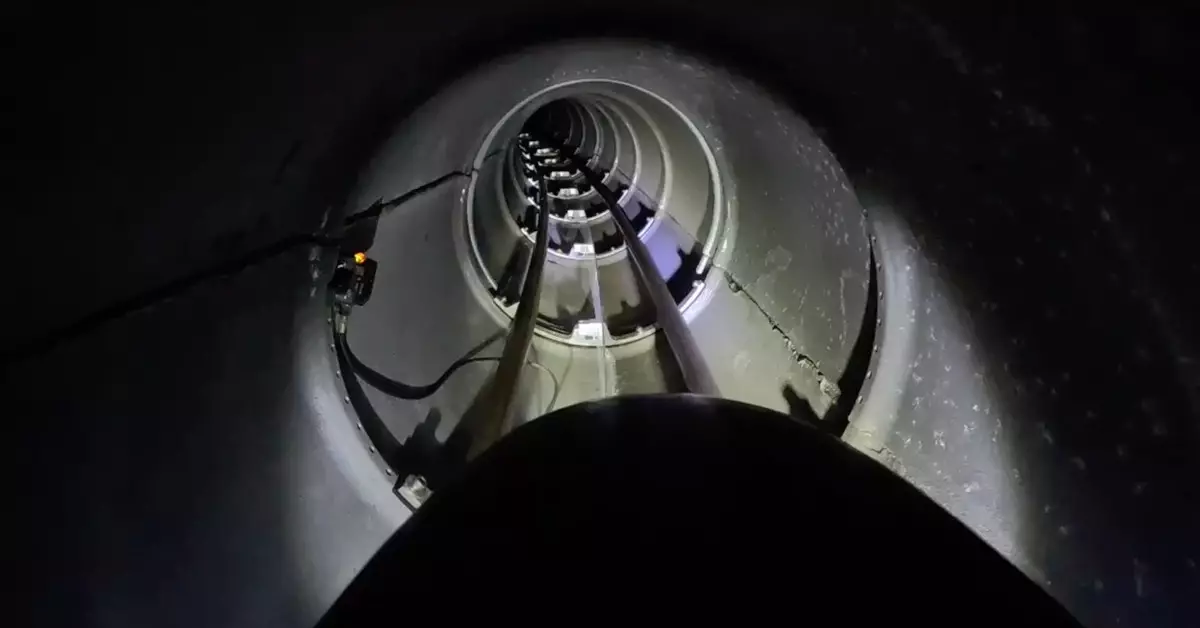Elon Musk’s hyperloop concept, proposed in 2013, promised to revolutionize the travel landscape with its vision of futuristic aluminum capsules zipping through low-pressure tubes at speeds reaching 760 mph. Over the years, this ambitious vision has captured the public’s imagination, yet the realization of a fully operational hyperloop has remained elusive. Despite significant advancements in technology and various projects attempting to bring this concept to life, skepticism abounds. Recent developments in Lausanne, Switzerland, where a 1/12th scale hyperloop model is being tested, highlight a fundamental question: have we merely replaced one form of venture capital fantasy with another?
In a recent announcement, researchers from the Federal Institute of Technology Lausanne, the School of Business and Engineering Vaud, and Swisspod Technologies reported a successful test on a 125.6-meter circular track. The performance of the system’s subsystems was evaluated, marking a step that some might tout as progress. However, the modest scale of the project raises eyebrows; one must wonder—can small-scale achievements truly be indicative of future success? The triumph of traveling approximately 11.8 kilometers at a speed of 40.7 km/h does make for a great story, but the leap from this model to a full-scale operational hyperloop is a chasm that is yet to be bridged.
Although the Swiss team lays claim to credible advancements in hyperloop technology, it is essential to recognize that their efforts are dwarfed by the financial turmoil that has plagued many hyperloop startups. Companies such as Hyperloop One, once celebrated as pioneers in this technological race, have faced closure due to financial mismanagement and the many regulatory obstacles that accompany large-scale infrastructure projects. The consistent failures of these ventures have led to the notion among critics that hyperloop technology primarily amounts to “vaporware”—an appealing concept that lacks the tenacity needed for real-world implementation.
Moreover, Musk’s own hyperloop aspirations appear to have been overshadowed by his recent business engagements. His focus has evidently shifted, as demonstrated by his advocacy for political figures rather than the creation of innovative solutions for transportation concerns. This shift indicates that, despite the initial promise of hyperloop technology as a viable replacement for traditional transportation methods, it faces obstacles from both the industry and from Musk himself.
Nonetheless, the Swiss hyperloop team’s relentless pursuit of innovation does signal a glimmer of hope. With plans to expand their testing facilities and investigate freight transportation systems, it seems aficionados of the hyperloop ideal are determined to prove their concept’s viability. Swisspod’s CEO, Denis Tudor, remains optimistic, emphasizing that building a larger track in the U.S. is paramount for transformative passenger transport.
The continuation of testing and improvement of sub-systems is indeed commendable. Yet, they are constricted by limitations that remain unaddressed, such as the effective integration of hyperloop systems into existing transportation infrastructure and the necessary financial backing to support scale-up efforts. Each test conducted can’t overshadow the practical realities and uncertainties that hover like a shadow over such ventures.
Looking Ahead: Realities versus Expectations
As we scrutinize the future of hyperloop technology, we must weigh the dazzling visions against the palpable challenges. The looming skepticism rooted in past failures and financial woes continues to make many question whether the hyperloop can ever evolve past theoretical discussions into a functional mode of transport. While the enthusiasm in Switzerland evokes hope, comprehensive, full-scale implementation remains, at best, a daunting challenge.
While it is easy to hold onto the hope that hyperloop technology could one day transform the way we travel, it’s crucial to maintain a grounded perspective toward this endeavor. As it stands, the landscape of hyperloop technology is fraught with challenges that demand not only ambition but also realistic solutions and enduring commitment from both innovators and investors. Time will tell if the hyperloop will indeed emerge as a pivotal advancement in transportation or if it will be remembered as a fleeting vision.

